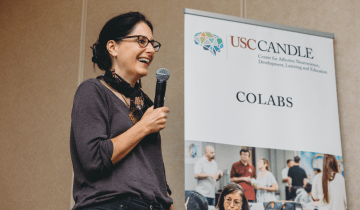Sometimes it can take a long while for professors to see their research make a real-world impact. By taking his scholarship public through social media, USC Rossier Associate Professor Morgan Polikoff has become one of the most influential experts in national and state education policy.
The most notable example is a letter to the U.S. Secretary of Education that Polikoff wrote last July expressing that the Department of Education should not mandate the use of proficiency rates as a metric of school performance.
Scholars knew that the performance-based metrics of No Child Left Behind were not working, but with its successor — the Every State Succeeds Act (ESSA) — it seemed as though the Department of Education was going to repeat the same mistakes when it came to measuring and reporting student achievement.
When the window opened for public comment on ESSA rules, Polikoff felt it was his duty as an expert in education policy to advocate on behalf of policies that would improve education for the nation's children.
Rather than submit the letter on his own, he first posted it on his blog in hopes of gaining support from other education-policy experts. He ended up getting a total of 93 signatures from educational researchers, K-12 educators and other interested parties.
“I was thinking if I could get 10 prominent education researchers who wanted to sign it, that would be great,” Polikoff says. “Once I posted it, it went as viral as anything a professor does goes viral. It got much more buzz than I was expecting, and I was getting a few emails a day from people I didn’t know saying they liked the letter and wanted to sign it.”
His main point was simple: By holding schools accountable based on the average standardized test scores of students rather than the percentage of students who are proficient, it would incentivize schools to focus on every student rather than those just below the proficiency cutoff.
The final rules were changed to reflect Polikoff’s recommendation. While the Trump administration has since repealed the regulations, states can move forward with some of the ideas put forward in the letter.
Representatives from departments of education in four states — Colorado, Connecticut, Iowa and Massachusetts — have contacted Polikoff to discuss changes they could make as states exert more freedom from federal education policy, with Colorado citing the letter in its accountability plan.
“His recommendations to use average scale score and performance indexes were very much in sync with Connecticut’s approach and evolution,” says Ajit Gopalakrishnan, chief performance officer for the Connecticut Department of Education. “Our commissioner met with Dr. Polikoff at a national event, and I followed up with Dr. Polikoff after that event to share what Connecticut was doing and express our appreciation for his advocacy for a better approach to student achievement.”
Polikoff also is making an impact in California’s education policy. He served on the state superintendent’s task force to overhaul the accountability system, which informed the development of the California School Dashboard using multiple indicators to measure a successful school rather than focusing solely on standardized test scores.
A mathematics major in college who once planned to be a secondary math teacher, Polikoff takes a personal interest in research into the effectiveness of math textbooks in California and other states. He is continuing research this year on a grant from the Bill and Melinda Gates Foundation as co-principal investigator of a project titled “Never Judge a Book by its Cover, Use Student Achievement Instead.” In April, he received the Early Career Award at the conference of the American Educational Research Association.
Polikoff indicates that he’s always thinking about how he can take the work he’s doing and make it more relevant through policy briefs, blogging, presentations to academic and non-academic audiences, and on Twitter, where he’s one of the most prominent USC professors, with more than 4,500 followers.
“If you want to bring your work to bear on policy issues, I think you have to do more than just publish it in peer-reviewed journals,” Polikoff says. “To have your research be influential in policy and practice, you have to be more intentional about it. For me, being an engaged, public intellectual is essential.”




